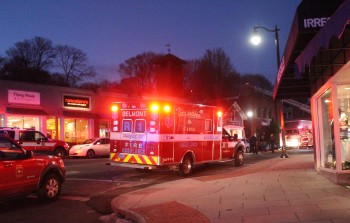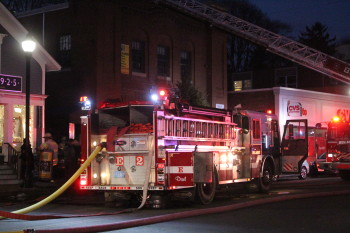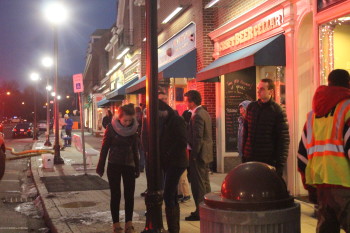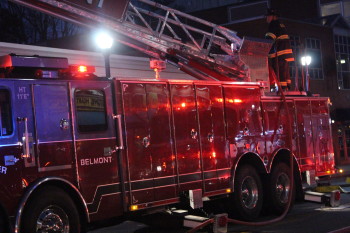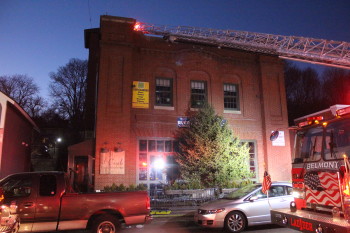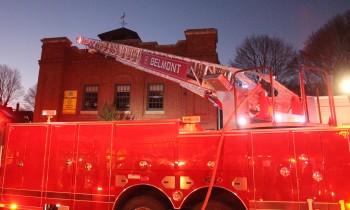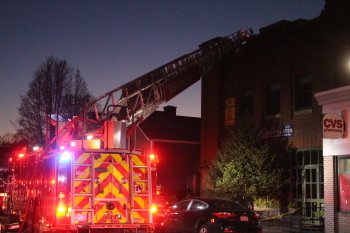Photo: The MSBA voting to invite Belmont to begin the process to renovate Belmont High School.
A decade of applications and waiting ended at 10:44 a.m. Wednesday morning, Jan. 27 in a crowded board room at 40 Broad St. in Boston as the Massachusetts State Building Authority voted to invite the Belmont School District to begin the process that Belmont officials anticipate will result in the complete renovation of Belmont High School and the construct of a new science wing at the Concord Avenue campus.
Massachusetts Treasurer Deb Goldberg, who heads the MSBA, made the announcement before nearly 100 school administrators and staff, politicians and local elected officials, including Belmont Superintendent John Phelan, Belmont High Principal Dan Richards and Belmont School Committee Chair Laurie Slap.
“This is great news for the town of Belmont,” said Slap after the vote.
See a video of the Belmont delegation responding to the vote: (from left: Superintendent John Phelan, School Committee Chair Laurie Slap and Belmont High Principal Dan Richards.
Belmont High was the only high school to be selected, joining seven elementary schools from Harvard, Lexington. Ludlow, Manchester Essex, Marlborough, Tisbury and Triton Regional districts to make the final cut.
A total of 26 building projects were vying for approval this year, including Arlington High School and the Maria Hastings Elementary School in Lexington.
With the MSBA vote, the clock begins running as the district enters a 270-day “eligibility period” in which the district is required to complete preliminary steps including forming a school building committee, hiring a building manager and conducting a feasibility study which establishes a process for the district to be reimbursed for eligible expenses. This is the first of eight “modules” the district and town will need to complete to receive the state grant.
(The process of creating a building committee is already underway as the special town meeting on Feb. 8 will include a vote to create a high school building committee.)
“During those 270 days, we’ll work all that information through and then meet with the community,” said Phelan.
For the Belmont delegation, the next few weeks will be educating themselves on what the state expects from the district.
“That’s what we going to find out in the next meeting, it’s the details,” said Richards.
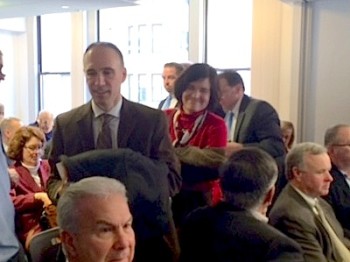
The project price tag, based on an updated 2008 estimation, was calculated at $79.6 million. With eight years of inflation added to the 2008 figure, the total cost is now closer to $100 million.
With a third of the eligible costs reimbursed by the MSBA, Belmont taxpayers will be responsible for $66 to $70 million of the total cost.
“This [project] has been on everyone’s minds for years and years,” said Slap. “Everyone understands the need for a renovated school so our job is to make sure that we plan this as carefully and thoughtfully as we can. We are always very respectful of taxpayer’s dollars but this is a critical project that has to be done.”
“We are going to have lots of time to educate the community and lots of community involvement. Stay tuned, there is lots to come,” said Slap.
- Construction at the school will take place in four phases over four years so students will remain on the existing campus,
- All construction will be within the 257,000 sq.-ft. footprint of the current building, and
- A 34,000 sq.-ft. Science wing will be built in the parking lot adjacent the Wenner Field House and the Higginbottom Pool.
The renovation of the five-decade-old school building is critical as it is currently “structurally unsound” and “jeopardize the health and safety of the school children,” according to Belmont’s 2014 SOI submitted to the MSBA.
The new science center will add 13.5 percent more classroom and lab space to the school, with the hope of “eliminat[ing] the existing severe overcrowding” at the school. The district is predicting an additional 254 students at the high school by fiscal 2024.






